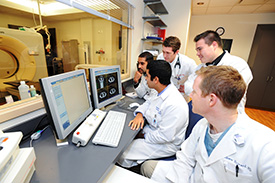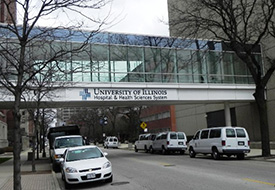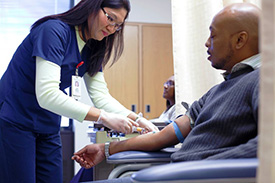Jan. 1, 2015:
A conversation with Robert A. Winn, MD, interim director of the University of Illinois Cancer Center, which is a member of the Big Ten Cancer Research Consortium.
Q: What kind of impact do you see the Big Ten Cancer Research Consortium having on cancer clinical trials?
On our own, we each have characteristics that demonstrate who we are individually and in the context of our institution. In the context of the Big Ten CRC, our consortium harnesses the clinical expertise of 12 leading cancer centers specifically related to breast, GI, GU, GYN, hematologic, melanoma, and thoracic malignancies. Additionally, this is a fascinating time to be conducting cancer clinical trials: there have been many advances in molecularly driven therapeutics, and these have led to the evolution of adaptive and basket-designed trials. This presents an incredible opportunity for us to build greater collaborations that otherwise wouldn’t exist. I think it goes beyond looking at ideas from other institutions. It’s looking at what each institution is actually doing and how are we going to work with them or find a way for them to work with us. This includes diversifying the populations we bring to clinical trials that the Big Ten communities serve, and diversifying the education that we can provide for our students. We each have this niche and whether it’s being able to bring in a specific population, or exploring cancer from a different perspective that we have in the past, or gaining access to a technology that we simply don’t have – this is the benefit of these relationships and the collaboration that comes with a consortium. It allows us to continue doing what we are doing, but to also expand that to our network and see what else can be brought to the table and what can benefit this research that we might not be thinking of. Someone else might have that one piece of the puzzle.
Q: What are some of the strengths that the University of Illinois Cancer Center brings to the consortium?
 The University of Illinois Cancer Center is proud to be a member of the Big Ten CRC. Our center has a mission focused on being the first comprehensive, community-focused cancer center. As an institution that encompasses four campuses, from the agricultural towns surrounding the Urbana-Champaign campus, to the urban landscape of the Chicago campus, to the Northern and Central Illinois campuses of Rockford and Peoria in between, our varied locations bring a diverse faculty, with more than 250 members and a wide variability of research. Within our campuses, our attention is focused on the underserved and health disparities, with an intentional effort to integrate ourselves into the local community.
The University of Illinois Cancer Center is proud to be a member of the Big Ten CRC. Our center has a mission focused on being the first comprehensive, community-focused cancer center. As an institution that encompasses four campuses, from the agricultural towns surrounding the Urbana-Champaign campus, to the urban landscape of the Chicago campus, to the Northern and Central Illinois campuses of Rockford and Peoria in between, our varied locations bring a diverse faculty, with more than 250 members and a wide variability of research. Within our campuses, our attention is focused on the underserved and health disparities, with an intentional effort to integrate ourselves into the local community.
The establishment of community-focused care has been done via an ambulatory care network of Federally Qualified Health Centers (FQHCs), through our Mile Square Health System. This also affords a partnership with community-based hospitals, which further provides for greater access to patient care on a larger geographical scale. Not only does this bring direct access of primary care, cancer screenings, education and treatment to patients in the community, but it also enables us as a cancer center to further develop our research efforts, utilizing data from our local health department. By understanding our demographics of cancer incidence and mortality rates, who is getting screened for various cancers, how much these populations know about cancer, we are then taking an evidence-based approach to our research and to our engagement within the community.
In an environment of health disparities and an underserved population, this opens up a dialogue with the Big Ten CRC that hasn’t previously been spoken about, and we are really excited about where we can take it. To bring clinical trials to this community, practicing students to this community, and current practitioners to this community, the population will have as much an opportunity to be treated as any other Big Ten population. And I think that the UICC is becoming the cancer center for this population.
Q: What kind of scientific developments happening at the University of Illinois Cancer Center are changing the way that we diagnose and treat cancer?
 The University of Illinois Cancer Center has a robust roster of research, both clinical and basic science, that draws from 11 distinct colleges, including medicine, applied health sciences, dentistry, nursing, pharmacy, and public health. This comprehensive research allows for unique collaborations throughout the continuum specifically related to cancer diagnosis and treatment. Dr. Kamesh Bikavilli has focused on the increased methylation of the amino acid arginine and the role it plays in driving lung cancer development. Dr. Gail Prins has been a leader in presenting the effects of BPA as a carcinogen, from its presence in plastics, to its presence in the womb and its contribution to prostate cancer. Dr. Joanne Tobacman has uncovered the dynamics of carrageenan, the seaweed extract that in both its degraded and undegraded forms is also a commonly used and highly carcinogenic food additive. Dr. Rashid Bashir has developed a microchip-like technology that can instantly test blood for HIV/AIDS and will have immeasurable utilization for cancer patients. As well, the director of our Clinical Trials Office, Dr. Arek Dudek, has led the first in-human clinical trials for GBM, in which the agent in this trial is called pro-caspase-3, developed by Dr. Paul Hergenrother and tested by Dr. Tim Fan.
The University of Illinois Cancer Center has a robust roster of research, both clinical and basic science, that draws from 11 distinct colleges, including medicine, applied health sciences, dentistry, nursing, pharmacy, and public health. This comprehensive research allows for unique collaborations throughout the continuum specifically related to cancer diagnosis and treatment. Dr. Kamesh Bikavilli has focused on the increased methylation of the amino acid arginine and the role it plays in driving lung cancer development. Dr. Gail Prins has been a leader in presenting the effects of BPA as a carcinogen, from its presence in plastics, to its presence in the womb and its contribution to prostate cancer. Dr. Joanne Tobacman has uncovered the dynamics of carrageenan, the seaweed extract that in both its degraded and undegraded forms is also a commonly used and highly carcinogenic food additive. Dr. Rashid Bashir has developed a microchip-like technology that can instantly test blood for HIV/AIDS and will have immeasurable utilization for cancer patients. As well, the director of our Clinical Trials Office, Dr. Arek Dudek, has led the first in-human clinical trials for GBM, in which the agent in this trial is called pro-caspase-3, developed by Dr. Paul Hergenrother and tested by Dr. Tim Fan.
Building upon our evidence-based approach to cancer treatment, our Diet and Behavior Shared Resource (DBSR) has enabled us to support a bench-to-community model, as we are exploring lifestyle and behavior factors that influence cancer outcomes. The DBSR’s Dr. Alicia Matthews is a national expert on cancer and health disparities, and currently running a clinical trial on smoking-cessation intervention in the LGBT population. As well, the Moving Forward program, developed by Dr. Melinda Stolley, not only confirmed the correlation between breast cancer and body weight, but provided and continues to provide African American female breast cancer survivors a weight loss and exercise program to minimize their cancer recurrence.
Q: How will being a part of the Big Ten CRC differ from other collaborative efforts of which your center has been a part?
 The Big Ten CRC is one of our larger collaborative efforts and brings to our cancer center a partnership that is greater than simply joining together on clinical trials. We have the common ground of an athletic conference, and that commonality cannot be underestimated. Outside of athletics, our alliance with the Big Ten CRC exemplifies the mission of a commitment to science, sharing our resources and developing new technologies that are changing the cancer world. This alliance is big enough, however, to include other factors in addition to clinical trials. I see our Big Ten CRC efforts as the potential to make significant inroads in how cancer is screened and prevented.
The Big Ten CRC is one of our larger collaborative efforts and brings to our cancer center a partnership that is greater than simply joining together on clinical trials. We have the common ground of an athletic conference, and that commonality cannot be underestimated. Outside of athletics, our alliance with the Big Ten CRC exemplifies the mission of a commitment to science, sharing our resources and developing new technologies that are changing the cancer world. This alliance is big enough, however, to include other factors in addition to clinical trials. I see our Big Ten CRC efforts as the potential to make significant inroads in how cancer is screened and prevented.
Here in Chicago, we have developed the Community Campus Cancer Collaborative, as a local entity to engage our surrounding organizations and populations that can most benefit from our institution and its mission. This is one example of our Cancer Center collaborations, and it is a successful one, but it is specific to the communities it serves. Our other external collaborations include those with our aldermen, our political and civic stakeholders, and our science and social science researchers. These are of paramount importance to the success of our engagement model and how we can make inroads within Illinois. I think these will booster our Big Ten efforts and they are just the start of a national platform that has unlimited potential.
About the Big Ten Cancer Research Consortium: The Big Ten Cancer Research Consortium creates a unique team-research culture to drive science rapidly from ideas to treatment-changing paradigms. Within this innovative environment, today’s research leaders collaborate with and mentor the research leaders of tomorrow with the unified goal of improving the lives of all patients with cancer.
About the Big Ten Conference: The Big Ten Conference is an association of world-class universities whose member institutions share a common mission of research, graduate, professional, and undergraduate teaching and public service. Founded in 1896, the Big Ten has sustained a comprehensive set of shared practices and policies that enforce the priority of academics in student-athletes’ lives and emphasize the values of integrity, fairness, and competitiveness. The broad-based athletic programs of the 14 Big Ten institutions provide nearly $200 million in direct financial aid to almost 9,500 student-athletes for more than 11,000 participation opportunities on 350 teams in 42 different sports. The Big Ten sponsors 28 official conference sports, 14 for men and 14 for women, including the addition of men’s and women’s lacrosse as official sports for the 2014-15 academic year. For more information, visit www.bigten.org.

















Subscribe to the Big Ten CRC Newsletter X
X Facebook
Facebook YouTube
YouTube